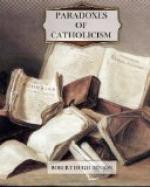I. (i) “You Catholics,” says one critic, “are far too credulous in matters of religion. You believe, not as reasonable men believe, because you have verified or experienced the truths you profess, but simply because these dogmas are presented to you by the Church. If reason and common-sense are gifts of God and intended for use, surely it is very strange to silence them in your search for the supreme truth. Faith, of course, has its place, but it must not be blind faith. Reason must test, verify, and interpret, or faith is mere credulity.
“Consider, for example, the words of Christ, This is My Body. Now the words as they stand may certainly be supposed to mean what you say they mean; yet, interpreted by Reason, they cannot possibly mean anything of the kind. Did not Christ Himself sit in bodily form at the table as He spoke them? How then could He hold Himself in His hand? Did He not speak in metaphors and images continually? Did He not call Himself a Door and a Vine? Using Reason, then, to interpret these words, it is evident that He meant no more than that He was instituting a memorial feast, in which the bread should symbolize His Body and the wine His Blood. So too with many other distinctively Catholic doctrines—with the Petrine claims, with the authority ‘to bind and loose,’ and the rest. Catholic belief on these points exhibits not faith properly so-called—that is, Faith tested by Reason—but mere credulity. God gave us all Reason! Then in His Name let us use it!”
(ii) From the other side comes precisely the opposite charge.
“You Catholics,” cries the other critic, “are far too argumentative and deductive and logical in your Faith. True Religion is a very simple thing; it is the attitude of a child who trusts and does not question. But with you Catholics Religion has degenerated into Theology. Jesus Christ did not write a Summa; He made a few plain statements which comprise, as they stand, the whole Christian Religion; they are full of mystery, no doubt, but it is He who left them mysterious. Why, then, should your theologians seek to penetrate into regions which He did not reveal and to elaborate what He left unelaborated?
“Take, for example, Christ’s words, This is My Body. Now of course these words are mysterious, and if Christ had meant that they should be otherwise, He would Himself have given the necessary comment upon them. Yet He did not; He left them in an awful and deep simplicity into which no human logic ought even to seek to penetrate. Yet see the vast and complicated theology that the traditions have either piled upon them or attempted to extract out of them; the philosophical theories by which it has been sought to elucidate them; the intricate and wide-reaching devotions that have been founded upon them! What have words like ‘Transubstantiation’ and ‘Concomitance,’ devotions like ‘Benediction,’ gatherings like Eucharistic Congresses to do with the




